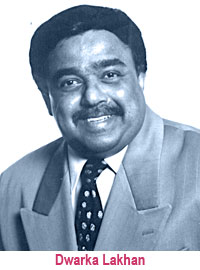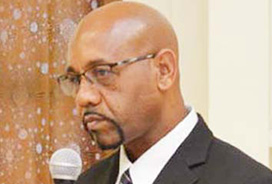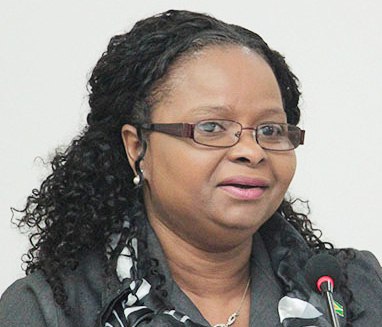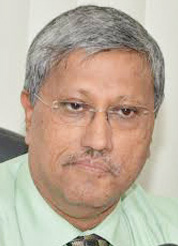Guyana Focus

Dark clouds hang over Guyana as the country prepares to celebrate its 51st year as an independent nation on May 26th. The silver lining which temporarily permeated last year’s 50th anniversary celebrations has disappeared under the gloom of deteriorating economic, political and social conditions – sucking the enthusiasm out of the population over independence celebrations.
For most Guyanese, independence has simply meant a government with a different face – 26 years of demagogic rule under the former PNC regime; 23 years under an arguably corrupt PPP government; and the past two years under an APNU+AFC coalition government, which has proven to be no different from its predecessors.
Over the past 51 years, their lifestyles have been increasingly affected by the machinations of politicians in their quest for power. In spite of independence, they seem to have less freedom each day. While politicians promise a “good life,” only a few enjoy such privilege.
Currently, the country faces a myriad of problems, with no hope in sight that conditions will get better in the near future. GDP growth has been declining steadily since the APNU+AFC coalition took office, and from all indications, will only fall further.
This is due to a decline in output in all key sectors, with the exception of gold. As a result, export earnings are down significantly, creating a severe shortage of foreign currency which has had a dampening effect on business activity.
The current scarcity of foreign currency brings back memories of the late 1970’s and early 1980s when it led to a massive reduction of imports and the banning of essential foodstuff. Then prices skyrocketed, inflation reached quadruple digits, unemployment soared, and Guyanese were relegated to one of the poorest people in the world. Massive starvation and heightened criminal activity added to their woes.
To deal with its woes, the government has been borrowing to fund its shortfalls, increasing the country’s debt burden and raising questions about its ability to repay the debt, given that revenues are falling.
Incidentally, revenues from oil are still three to five years away – although the government is already planning for a windfall. And oil wealth is not guaranteed to make things better. Useful lessons can be learned from the current struggles of Trinidad & Tobago in the wake of lower oil prices.
The deterioration in economic growth has led to an increase in unemployment, compounded by the loss of jobs resulting from downsizing the sugar industry and the decline in manufacturing and overall business activity. Government promises of creating jobs – particularly for youths – are barren.
In the meantime, crime rates remain high, driving fear into the population, while corruption continues unabated, causing the population to lose trust in the government.
Arguably, government's efforts to deal with corrupt practices of the previous administration have more elements of a witch-hunt than a true attempt to deal with corruption.
Apparently, corruption has become pervasive at all levels of society, a trend that has persisted since independence. High levels of bureaucracy and the lack of transparency in decision-making add to the perception of corruption, leaving the average Guyanese at the mercy of those who wield power.
Outside of the mining and oil sectors, foreign direct investments have dried up, largely due to a lack of confidence in the government.
Although overt attempts by the government to stem the underground economy and illegal inflows of foreign funds are commendable, they seem to be more targeted at specific alliances and businesses associated directly and indirectly with the former PPP administration.
Yet, the underground economy and its associated ills appear to be flourishing. In the US State Department’s 2017 International Narcotics Control Strategy Report, it was noted that in Guyana “there is a culture of using informal networks to move money between Guyana and the diaspora” which has a large cash-based economy. The report contends that many criminals use cash couriers or familial networks to move large sums of money between Guyana and the United States.
It further states that unregulated currency exchange houses (cambios) also pose a risk, as they are used both for the exchange of currency and to transfer funds to and from the diaspora. In addition, the report notes that casinos which are legal in Guyana, pose a risk for money laundering.
Evidently, the government faces a tall order in trying to break down an entrenched structure which it inherited. But it is obviously doing a bad job while building its own contemptuous structure.
While criticisms of the government’s performance and its ability to run the country are rife, it recently claimed that it has done well since assuming power by listing 125 achievements in a two-page spread published in the local press - including lowering the Berbice Bridge tolls, maintaining a cleaner Georgetown, increasing the wages of public servants, holding the first Local Government Elections in more than two decades, and enabling less piracy and greater transparency.
The bottom line though, is the majority of items on the list have had a minimal impact on what matters most to Guyana, that is, moving the country forward economically. Rather, they are mere items that contribute to the government’s political image.
The truth is, for the poor who make up more than one-half of the population, independence has meant more suffering, more hardship, and sub-par living standards. Veiled attempts to uplift the poor, have been more about politics than about people.
During the first quarter century of independence mismanagement and misallocation of resources ruined the economy. Racial tensions led to a massive exodus of qualified Guyanese. Civil liberties were eliminated; human and political rights were systematically eroded; the judicial system was compromised by political influence; press freedom was curtailed; travel restrictions were imposed; rights to assembly were undermined; and workers were harassed and victimized.
The majority of the population faced incessant persecution. Ironically, the current administration continues to face allegations of human rights abuses, victimization, political interference, and abuse of power.
Rigged elections from independence until 1992 also took away the people’s freedom to elect the government of their choice.
Although the return of a democratic government in 1992 provided Guyanese with real hope of independence, it was short-lived. Political tensions with racial undertones returned and have persisted until now, periodically rearing its ugly head.
Plus, available opportunities have been restricted to a small group of the population, making the poor poorer and contributing to a widening rich-poor gap. Positive signs of major infrastructural improvements have not been accompanied by commensurate economic activity for the benefit of the population at large – although they are cited as achievements in an independent Guyana.
In spite of the country’s problems, the 51st independence anniversary celebrations will provide an opportunity for the ruling government to showcase a supposedly independent Guyana and for certain segments of the population to “party their worries away” for a short period of time. But when sobriety returns after the party they will realize that their happiness is only fleeting and independence does not have much meaning unless the government gets its house in order.
duty free concession – PS

This was confirmed Monday by Permanent Secretary of the Department of Public Service, Reginald Brotherson. It is protocol that government officials who wish to benefit from duty free concessions obtain the Public Service Ministry approval.
According to Brotherson, “Mr Wills had applied for Duty Free. He had applied as Head of Customs and he wanted to bring in a particular car – a Harrier 2008 with an engine capacity of 2360 CC – but we didn’t grant the approval.” Brotherson said that he had written a letter to the Guyana Revenue Authority in this regard and it was dated November 30, 2016.
The PS said that the reasons for disapproving the application were that the year of the vehicle had breached GRA’s regulations and the engine capacity of the vehicle was too high for the position that Wills held. GRA has instituted a regulation that does not allow for the importation of vehicles eight years or older. Further, Brotherson said that the engine capacity of the vehicle was too high for the position Wills holds.
“So, because I think, it was over the required CC, we didn’t grant the approval. You see we are the Ministry that gives approval. Let me tell you what happens; we will give an approval based on whether the post (position) attracts travel allowance; that is the remit of the Department of Public Service.
“It must be on the General Register of Authorised Travelling Positions. So we give that and we give the scale of the allowances. It is our remit to add or to remove and to recommend eligible officers in keeping with their employment engagement, whether contract or a part of the pensionable establishment. However, it is the GRA’s remit under the Act of 2015 I think to approve or disapprove of Duty Free Concessions.”
Brotherson added that his Department would look at the position of the person that is applying for the concession to ascertain whether that position is named on the list of authorised travelling posts.
When the submission comes to us, we check and we confirm in our register that this post is authorised based on the capacity, whether it is a Tier C or a Tier A. When we send that to the GRA now, GRA uses their determination in keeping with the (Customs) Act, to grant the duty free concession.”
He said that the GRA has the duty free concession remit and his Department has the remit to say whether the post is a travelling post. “In the case of Mr Wills, while he might be holding a travelling post, (because of) the engine capacity of the Harrier, he was not entitled to a capacity of 2360 CC. They (GRA) got to apply whatever mechanism they want.”
The PS reiterated that his Department is only responsible for approving the travelling post and the GRA takes it from there.
Brotherson added, “If GRA could find within their Act an accommodation for that, that is a matter for the Commissioner General according to Law, regardless of who is holding that office. All we do here is grant the approval based on the General Register and what the capacity of that post carries.”
Based on the information supplied by the Customs Head, Kaieteur News reported making contact with the Guyana Revenue Authority’s Public Relations Officer Ms Baird for an update on the matter. According to the paper, the PRO said that the Revenue Authority declined to comment on the issue.
The paper reported contacting Wills over the weekend who directed that all questions should be directed to Commissioner-General of GRA, Godfrey Statia. Statia reportedly could not be contacted. Wills, however, defended his name saying that there is no truth to the matter.
The Customs Head had reportedly imported the vehicle last January after Brotherson had turned down his application. The vehicle was registered under PVV 9800 in his name. According to GRA’s regulations the Ministry should not approve duty free concessions on vehicles with engine capacities above 2000cc to public servants. These concessions are reserved for persons sitting in the position of Judges, Parliamentarians and Remigrants.
Further, persons who enjoy duty free concessions on vehicles over four years are required to pay a percentage of a flat rate of duty. Based on the CC of Wills’ vehicle, it would have attracted a concessionary rate of duty of $1.8M without the duty free concession. The Customs chief would have therefore been required to pay $6.5M more in duties and taxes. As a result, Wills paid $184,917 which represents 10 per cent duty. However, only re-migrants enjoy this rate.
Kaieteur News opined that officials within GRA would have raised concerns over the issue but this was quietened by senior officials.
forfeits US$536,200
Blackman had been accused of illegally distributing oxycodone, a highly addictive prescription painkiller. He had been facing up to 71 months, but his defence counsel had pleaded for a lower sentencing.
Additionally, United States District Judge Joanna Seybert ordered Blackman, 69, to forfeit US$536,200 in illegal proceeds, according to the US Department of Justice. The sentence followed the defendant’s guilty plea on August 24, 2016.
The sentence was announced by Bridget M. Rohde, Acting United States Attorney for the Eastern District of New York; James J. Hunt, Special Agent-in-Charge, Drug Enforcement Administration (DEA), New York Division; and Angel M. Melendez, Special Agent-in-Charge, U.S. Immigration and Customs Enforcement, Homeland Security Investigations (HSI), New York.
Between 2015 and 2016, Blackman prescribed more than 365,000 30-milligram oxycodone pills from “pain management” clinics that he worked out of in Elmhurst, Queens, Franklin Square, Long Island and Cypress Hills, Brooklyn. He was listed as being from Valley Stream, New York.
During his guilty plea allocution before Judge Seybert last August, Blackman admitted that, in exchange for US$300 cash payments, he wrote oxycodone prescriptions for 1,920 30 milligram oxycodone pills to persons whom he knew had no legitimate medical need for that highly-addictive drug.
As described in court papers, that amount of oxycodone was worth up to US$57,600 on the street.
According to court filings, on February 7, 2016, HSI agents removed Blackman from a plane at John F. Kennedy International Airport en route to Guyana and arrested him in connection with the illegal distribution of oxycodone. He was returning to Guyana to take up his position as Chairman of the Georgetown Public Hospital Corporation.
The Government of Guyana was forced to name another doctor, Dr. Carl ‘Max’ Hanoman as the new Chairman.
At the time of his arrest, more than US$30,000 was found concealed in Blackman’s luggage. Following his arrest, Blackman admitted that he believed that some of his patients were addicted to oxycodone.
Blackman has lost his licence to practice medicine in the US and because he is not a US citizen, is likely to be deported on completion of his sentence.
“Today’s sentence should send a clear message to other doctors and medical professionals that when they abandon their oaths and act as drug dealers, we will prosecute them to the fullest extent of the law,” stated Acting US Attorney Rohde.
“Blackman violated his professional oath to put his patients’ legitimate medical needs first, and instead chose to line his pockets with the proceeds of sales from oxycodone, which has ravaged communities in New York City and on Long Island. Together with our law enforcement partners, we will continue to vigorously prosecute illegal prescription drug distribution.”
Rohde thanked the DEA’s Long Island Tactical Diversion Squad, comprising agents and officers from the DEA, Nassau County Police Department, Rockville Centre Police Department, Suffolk County Police Department, Port Washington Police Department and Internal Revenue Service, for its participation and assistance in the investigation.
“Prescribing ‘oxys’ in exchange for cash is no different than a street dealer’s hand to hand drug transaction; both are illegal and fuel drug misuse in our communities. Today’s sentencing is a result of law enforcement’s collaborative work,” stated DEA Special Agent-in-Charge Hunt.
“Blackman prescribed highly addictive pills to people who had no legitimate need. To add to his crime, he knowingly handed out prescriptions for oxycodone to individuals he knew were already addicted,” stated HSI Special Agent-in-Charge Melendez.
“Blackman’s actions make him no different than the street-corner drug pusher. Today’s sentencing should stand as a reminder to others that we will continue our joint law enforcement efforts to ensure that crooked doctors like Blackman can no longer put pen to pad and cause more harm.”
The government’s case was being handled by the Office’s Long Island Criminal and Civil Divisions. Assistant United States Attorneys Bradley T. King and Madeline O’Connor are in charge of the prosecution.
of Rose Hall estate

The three-hour-long strike saw operations at the estate coming to a standstill, while housewives, business owners and regional officials stood in solidarity with the outraged sugar workers.
The large crowd assembled at the Rose Hall Sugar Estate at 7:00 am but reverted to marching down the main access road gathering a large crowd of spectators. As the massive crowd marched, the men shouted “No to the closure”.
The protest action comes in light of Agriculture Minister Noel Holder’s announcement the Monday prior that by year 2017, the nation will see the closure of two more sugar estates, the cut down of annual production, and the medical services offered by the estates turned over to the government.
One worker of the harvesting gang told Kaieteur News that government needs to rethink its decision as the closure of such a major estate will affect the entire country.
“We need the sugar estate. Without this estate, this town can’t function. How you gonna take away jobs from people and you not creating new ones. Dat mek sense?”
Another worker, Marvin Sudoo, a sugar worker for 28 years, stated that government needs to find other alternatives to save the industry. “If they close this estate, wah we guh do? How me sending me pickney dem to school? How? They tekkin’ way we job and them nah create nun mo”.
Another worker, Glenn McLeod called on the President to listen to the cries of the sugar workers. He stated that Guyana was built on the strong foundation of the sugar industry.
“Is sugar bring everybody hay. Sugar got this country where it is today. When you trimming a tree, you does trim from de top not de bottom. So government need to find another solution to fix this sugar industry. Is the big officials draining the money, not we poor people. And is we feeling the pressure not them”.
One business owner Sherry Beepat, who operates a furniture establishment in Canefield, East Canje, stressed that the closure of the estate will result in the closure of her business.
“A lot of people from the estate buy furniture from my store on terms, so if you tek way these people jobs, how am I getting paid? Is the government so blind they not seeing what these actions are doing to poor people? They are bleeding the poor dry.”
A housewife, Pam Singh, stated that she has to repay the bank every month and this expected closure will leave her homeless.
“Me does gotta pay bank every month. How me gonna pay if me husband nah bring home money gimme. Is Granger gonna pay bank fuh me? Da me want know, ‘cause dem nah see how poor people ah get pressure in this country”.
Regional Chairman David Armagon disclosed to Kaieteur News that action will result in a regional shutdown. “The sugar workers have realized that government is concrete in their decision to shut down the Rose Hall Estate, and that is why people are out here in their numbers airing their concerns. This small town with be hit by an economic crisis that will result in its shutdown if this estate is closed”.
Armagon noted that “thousands of people will be out of jobs and this will create a ripple effect on the entire country. They are fooling the people by saying alternative employment will be created at the other estates and they are slashing production by 7000 acres, meaning the decrease in the workforce”.
Meanwhile, GAWU's General Secretary Seepaul Narine who joined the protest line expressed his concerns regarding the future of the sugar workers if the closure plans are executed.
According to Narine “the days ahead are bleak for these sugar workers and their families and also the country as a whole, because government fails to see the major impact sugar is making on Guyana’s economy”.
Narine stated that the estate is one of the main sources of sustenance within the Berbice area and if closed will result in economy taking a further plunge down the deep end.
“We are hoping that good sense will prevail and that government will hear the cries of these sugar workers and listen and try to make life better for them as was promised when they took office”. The protest actions are expected to continue throughout the upcoming weeks. (Kaieteur News)

While a figure has not been put, it is safe to state that millions of dollars in dangerous drugs have been stolen from the state. Information about the pilfering was released when Lawrence responded to written questions posed to her in the National Assembly by Member of Parliament, Bishop Juan Edghill.
Minister Lawrence was asked if she had information about employees of the Ministry of Health, and, in particular the Materials Management Unit (Diamond Bond) or the Georgetown Public Hospital Corporation (GPHC) being complicit with contractors or suppliers of pharmaceutical and medical supplies in defrauding the state.
She was also asked to state what actions have been taken to investigate the allegations. She answered in the affirmative, insisting that there have been such cases of thieving.
Lawrence indicated that there was pilfering of drugs at the Materials Management Unit. She said that an employee was found with vials of insulin in his possession. Police were called to look at the matter. Lawrence said that the unidentified employee was subsequently arrested and placed on bail.
She said that he never reported for duty thereafter and the matter is still engaging the police. Lawrence said that the Ministry has since put measures in place to stop pilfering.
West Demerara Regional Hospital also had incidents of pilfering. The identities of the two accused were also protected in this instance. Lawrence said, “The Pharmacist and his wife were working in the main drug bond. A visit to the bond by the Ministerial Task Force found some discrepancies in the manner in which the dangerous drugs were being stored and accounted for.”
She said that the Task Force returned to the hospital in February and found that the drugs ledger had been tampered with. Figures were retraced, numbers were changed.
Lawrence said that the unnamed Pharmacist could not give account for several ampoules of the Pethidine, Codeine and Morphine in his possession.
The police were subsequently called in and both the Pharmacist and his wife were arrested. Lawrence indicated that the matter is still engaging the police.
Codeine is an opioid pain medication. An opioid is sometimes called a narcotic. The drug is used to treat mild to moderately severe pain. It is stated that Codeine can slow or stop breathing, and may be habit-forming. The drug is only supposed to be used as prescribed.
Misuse of narcotic medicine can cause addiction, overdose, or death, especially in a child or other person using the medicine without a prescription.
Morphine is also a narcotic med. It is used to treat moderate to severe pain. Formulations are taken as needed for pain and so is Pethidine. Both are highly addictive drugs.
Dangerous drugs of this sort were also sent to Suddie Hospital but according to Lawrence, drugs sent to that location never arrived.
She said, “The Ministerial Task Force visited and found that some of the drugs never arrived at the hospital. The Pharmacist could not give account for several dangerous drugs and had not been making entries in his dangerous drugs ledger since 2015. This matter is till engaging the police”
Another case was highlighted but this time in New Amsterdam. Lawrence said that the Regional Pharmacist attached to the New Amsterdam Hospital was charged and placed on bail for pilfering but was never interdicted from duty. This staff member has now been sent on leave to allow for an investigation.
Further, Lawrence said that the Commission of Inquiry report has listed names of employees from the Ministry of Health Procurement department who have been complicit with contractors.

The industry was meeting to address a series of challenges it is experiencing in both the local and export markets.
The export oriented regional rum industry, earns in excess of US$550M in foreign exchange every year, but also depends on healthy local markets as its base. According to Samaroo, rum companies rely on the profitability in their local market to be able to finance entry into export markets which are highly competitive and where regional producers are up against global spirits giants.
According to WIRSPA, the regional brands continue to face an uphill battle against these companies, several of whom may be benefiting from substantial subsidies provided through the United States tax system in the form of ‘Cover-Over’ payments. These payments are tax rebates given to producers in the US Virgin Islands and Puerto Rico when they sell rum into the US.
“Increasingly”, says Samaroo, “we’re seeing brands entering our local markets which benefit from these subsidies and are selling well below what we would consider to be expected costs. So not only are we up against subsidised brands in the export markets, but these brands are now entering local markets as well.”
Minister of International Business, Industry and Commerce for Barbados, Donville Inniss, said at a function to taste the authentic rums of the grouping, “It goes against the WTO practices and it is just fundamentally wrong because you are taxing our rum coming in from the Caribbean at exorbitant rates to subsidise others and that really and truly does not help our economic growth and development.”
In thanking his colleagues for the trust placed in him to lead the group, Samaroo said that it was a mark of maturity for the industry that leadership changes occurred within the context of continuity and thanked the previous chairman, Dr. Frank Ward, for his stewardship of the organisation over the last seven years.



To advertise in ICW call
Call 905-738-5005